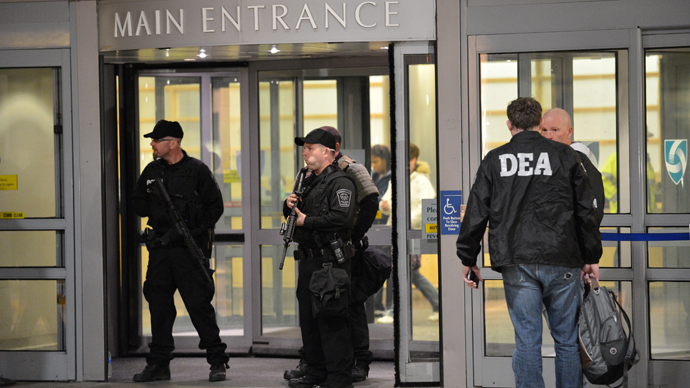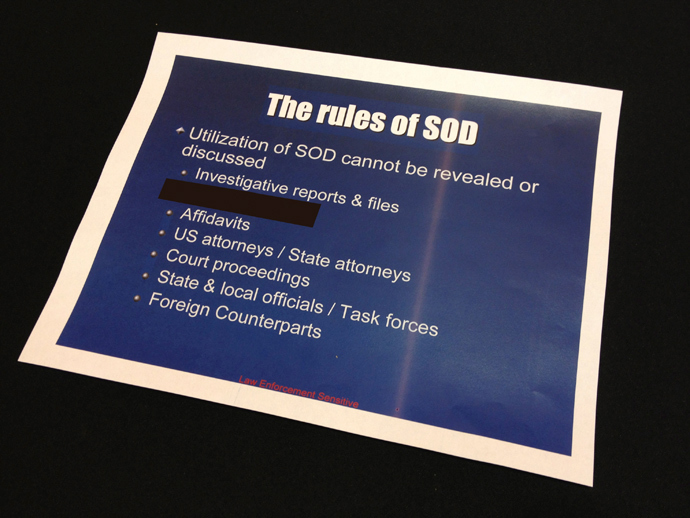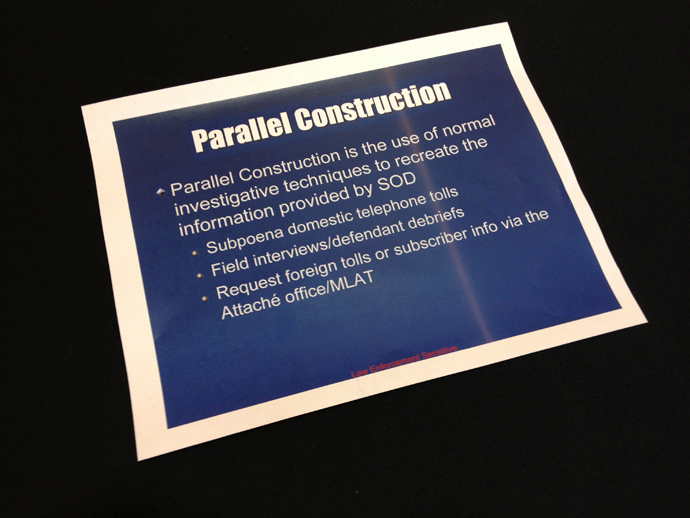DEA agents use NSA intercepts to investigate Americans – report

Agents of a secretive DEA unit routinely receive tips from US intelligence agencies, including NSA intercepts, a report states. The sources are then concealed with "parallel construction" of evidence – a troubling practice that many call unconstitutional.
A document obtained by Reuters “specifically directs” the
agents of the Special Operations Division (SOD) to cover up their
information sources from investigative reports, affidavits,
discussions with prosecutors and courtroom testimony.
Such sources may include intelligence intercepts, wiretaps,
three-letter-agencies’ informants and a massive database of
telephone records – all of which could reportedly be used to help
the authorities launch criminal investigations of Americans.
“Remember that the utilization of SOD cannot be revealed or
discussed in any investigative function,” reads the document,
which is said to be presented to the agents of this Drug
Enforcement Administration (DEA) unit.

SOD is comprised of two dozen partner agencies, which include the FBI, CIA, NSA, Internal Revenue Service and the Department of Homeland Security, and much of the unit’s work is classified.
The unit is said to be offering at least three services to
federal, state and local law enforcement agents: coordinating
international investigations; distributing tips from overseas NSA
intercepts, informants, foreign law enforcement partners and
domestic wiretaps; and circulating tips from a massive database
known as DICE.
Instead of revealing the agencies’ part in any launch of a
criminal case, the agents are instructed to use “normal
investigative techniques to recreate the information provided by
SOD.”
This in effect means certain “tips” might be given to the
agents and the police on condition they never talk about them in
court.
A former US federal agent who received such tips from SOD
described the process to Reuters. “You’d be told only, ‘Be at
a certain truck stop at a certain time and look for a certain
vehicle.’ And so we’d alert the state police to find an excuse to
stop that vehicle, and then have a drug dog search it.”
Following the arrest, the agents would then pretend the
investigation started with the traffic stop, he said.
This process, referred to as “parallel construction,” is a
routine practice used by the agents, two senior DEA officials
told the news agency, speaking on condition of anonymity.

“Parallel construction is a law enforcement technique we use every day,” one official said, adding that it was “decades old, a bedrock concept” that was used to protect sources and investigative methods.
While most of “a dozen” of other agents interviewed by
Reuters were said to have defended the tactics as “legal,”
former DEA agent Finn Selander has compared it to a criminal
activity.
“It’s just like laundering money – you work it backwards to
make it clean,” Selander, who is now a member of the Law
Enforcement Against Prohibition group, explained.
‘Blatantly unconstitutional’
Meanwhile, lawyers, prosecutors and legal experts have been
outraged by the report, saying that if the so-called “parallel
construction” was indeed used for disguising how an
investigation began it explicitly violates pretrial discovery
rules.
Such practice “would not only be alarming but pretty blatantly
unconstitutional,” Lawrence Lustberg, a New Jersey defense
lawyer has said.
In particular, it would violate the defendants’ Constitutional
right to a fair trial, since if they don’t know how an
investigation really began, they cannot ask to review potential
sources of exculpatory evidence – information that could reveal
entrapment, mistakes or biased witnesses.
By use of the SOD program the US government could also
“skirt” the established court procedures, by which judges
privately examine sensitive information (informant’s identity,
classified evidence etc.) to determine whether the information is
relevant to the defense – something which some lawyers find
unacceptable.
“You can’t game the system. You can’t create this subterfuge.
These are drug crimes, not national security cases. If you don't
draw the line here, where do you draw it?” said former
federal prosecutor Henry E. Hockeimer Jr.
The US legal system is very sensitive to the way the evidence is
handled, and if the defense or prosecution finds its source
inappropriate, the case may be overturned.

An unnamed federal prosecutor said he refused to file charges in
a Florida drug case after he learned a DEA agent “lied” to
him about where the information came from – it was later revealed
he had actually used a SOD tip based on an NSA intercept. The
prosecutor said the fact of concealing the information source
alone made him lose confidence in the investigation.
Nancy Gertner, a Harvard Law School professor who served as a
federal judge for 17 years, said the report sounds more troubling
than recent Edward Snowden revelations that the NSA has been
indiscriminately collecting domestic phone records.
“It is one thing to create special rules for national
security. Ordinary crime is entirely different. It sounds like
they are phonying up investigations,” Gertner believes.
The Special Operations Division was created in 1994 to initially
combat Latin American drug cartels, and has since grown from
several dozen employees to several hundred.
Since its inception, the SOD’s mandate has expanded to include
narco-terrorism, organized crime and gangs. A recent LinkedIn
posting on the personal page of a senior SOD official reportedly
estimated the unit’s annual budget to be $125 million.

The unit played a major role in the case against Russian arms dealer Viktor Bout, who was extradited to the US from Thailand and in 2011 sentenced to 25 years in jail on charges of conspiring to sell weapons to the Colombian rebel group FARC.
According to DEA officials, the DICE database they use contains
about 1 billion records and largely consists of phone logs and
Internet data gathered legally by the DEA through subpoenas,
arrests and search warrants nationwide. Those records are said to
be kept for about a year and then purged.
About 10,000 federal, state and local law enforcement agents use
the DICE database “to connect the dots,” according to an
official cited by Reuters.
But the DEA official insists that tips from intelligence
agencies, such as the NSA, are generally not forwarded to the SOD
until a caller’s citizenship can be verified, as warrantless
eavesdropping on Americans is illegal.














